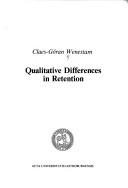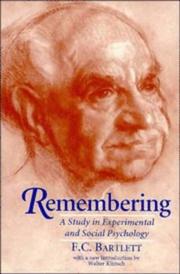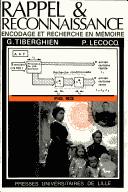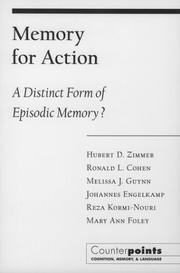| Listing 1 - 10 of 31 | << page >> |
Sort by
|

ISBN: 9173460826 Year: 1980 Publisher: Göteborg Acta universitatis Gothoburgensis
Abstract | Keywords | Export | Availability | Bookmark
 Loading...
Loading...Choose an application
- Reference Manager
- EndNote
- RefWorks (Direct export to RefWorks)
Comprehension --- Recollection (Psychology) --- Understanding --- Apperception --- Learning, Psychology of --- Memory --- Recall (Psychology) --- Recognition (Psychology) --- Recollection (Psychology). --- Comprehension.

ISBN: 0521483565 052148278X 0511759185 9780521483568 9780511759185 9780521482783 Year: 1995 Publisher: Cambridge Cambridge University Press
Abstract | Keywords | Export | Availability | Bookmark
 Loading...
Loading...Choose an application
- Reference Manager
- EndNote
- RefWorks (Direct export to RefWorks)
In 1932, Cambridge University Press published Remembering, by psychologist, Frederic Bartlett. The landmark book described fascinating studies of memory and presented the theory of schema which informs much of cognitive science and psychology today. In Bartlett's most famous experiment, he had subjects read a Native American story about ghosts and had them retell the tale later. Because their background was so different from the cultural context of the story, the subjects changed details in the story that they could not understand. Based on observations like these, Bartlett developed his claim that memory is a process of reconstruction, and that this construction is in important ways a social act. His concerns about the social psychology of memory and the cultural context of remembering were long neglected but are finding an interested and responsive audience today. Now reissued in paperback, Remembering has a new Introduction by Walter Kintsch of the University of Colorado, Boulder.
Cognitive psychology --- Recollection (Psychology) --- Recognition (Psychology) --- Health Sciences --- Psychiatry & Psychology --- Memory --- Recall (Psychology)

ISBN: 2859392165 Year: 1983 Publisher: Lille : Presses universitaires de Lille,
Abstract | Keywords | Export | Availability | Bookmark
 Loading...
Loading...Choose an application
- Reference Manager
- EndNote
- RefWorks (Direct export to RefWorks)
Recollection (Psychology) --- Recognition (Psychology) --- Rappel (Psychologie) --- Récognition (Psychologie) --- Recall (Psychology) --- Memory --- Theses --- Recognition (Psychology). --- Recollection (Psychology). --- Récognition (Psychologie)
Book
ISBN: 9789085064152 9085064155 Year: 2007 Publisher: Amsterdam : SUN,
Abstract | Keywords | Export | Availability | Bookmark
 Loading...
Loading...Choose an application
- Reference Manager
- EndNote
- RefWorks (Direct export to RefWorks)
Non-fiction --- Dutch literature --- Recollection (Psychology) --- Autobiography --- Autobiography. --- Recollection (Psychology). --- Recall (Psychology) --- Autobiographies --- Egodocuments --- Memoirs --- History and criticism --- Technique --- Memory --- Recognition (Psychology) --- Biography as a literary form
Book
ISBN: 9789044131468 Year: 2014 Volume: 19 Publisher: Antwerpen Garant
Abstract | Keywords | Export | Availability | Bookmark
 Loading...
Loading...Choose an application
- Reference Manager
- EndNote
- RefWorks (Direct export to RefWorks)
Recall (Psychology) --- Recollectie (Psychologie) --- Recollection (Psychology) --- Reconstructie (Psychologie) --- Reconstruction (Psychologie) --- Refoulement (Psychologie) --- Remémoration (Psychologie) --- Repression (Psychology) --- Récollection (Psychologie) --- Verdringing (Psychologie) --- geheugen --- psychiatrie --- psychoanalyse --- psychotherapie --- Psychoanalyse. --- Memory --- Physiological aspects

ISBN: 1280529563 0195353978 1429400633 9781429400633 9780195115536 0195115538 9780195353976 0195115538 0195115546 9780195115543 0197736106 Year: 2001 Publisher: New York Oxford University Press
Abstract | Keywords | Export | Availability | Bookmark
 Loading...
Loading...Choose an application
- Reference Manager
- EndNote
- RefWorks (Direct export to RefWorks)
Gives an overview of the results from laboratory research on action memory and on memory for activities in social contexts. This work presents results on memory for intended actions. It puts these results in relation to the information and to the brain modules which are necessary for successful control of actions.
Memory. --- Recollection (Psychology) --- Recall (Psychology) --- Memory --- Recognition (Psychology) --- Retention (Psychology) --- Intellect --- Psychology --- Thought and thinking --- Comprehension --- Executive functions (Neuropsychology) --- Mnemonics --- Perseveration (Psychology) --- Reproduction (Psychology)
Book
ISBN: 1139950312 1139961985 1139949268 1139960938 1139956698 1139958828 1139957767 1139959875 1139547380 9781139957762 9781139547383 9781139959872 9781107035225 1107035228 1316623262 9781316623268 Year: 2014 Publisher: New York
Abstract | Keywords | Export | Availability | Bookmark
 Loading...
Loading...Choose an application
- Reference Manager
- EndNote
- RefWorks (Direct export to RefWorks)
When the memory retrieval process breaks down, people wonder exactly why and how such a thing occurs. In many cases, failed retrieval is accompanied by a 'tip-of-the-tongue state', a feeling that an unretrieved item is stored in memory. Tip-of-the-tongue states stand at the crossroads of several research traditions within cognitive science. Some research focuses on the nature of the retrieval failure. Other research tries to determine what tip-of-the-tongue states can tell us about the organization of lexical memory - what aspects of a word we can recall when we are otherwise unable to do so. Still other research focuses on the nature of the experience. Each perspective is represented in this book, which presents the best theoretical and empirical work on these subjects. Much of the work is cross-disciplinary, but the topics concern strong phenomenological states of knowing that are not accompanied by recall or recognition of the desired information.
Memory disorders. --- Metacognition. --- Recollection (Psychology) --- Recall (Psychology) --- Memory --- Recognition (Psychology) --- Meta knowledge --- Metamemory --- Cognition --- Self-control --- Self-perception --- Impairment, Memory --- Memory, Disorders of --- Memory impairment --- Paramnesia --- Cognition disorders
Book
ISBN: 9781442221819 144222181X 129960546X 9781299605466 9781442221802 1442221801 Year: 2013 Publisher: Lanham
Abstract | Keywords | Export | Availability | Bookmark
 Loading...
Loading...Choose an application
- Reference Manager
- EndNote
- RefWorks (Direct export to RefWorks)
Dawn of Memories explores the significance of first memories and enables individuals to understand the meaning of early recollections throughout their lives. Using historical examples as well as firsthand accounts, the author explores the very real way early memories impact us throughout our lives.
Reminiscing. --- Recollection (Psychology) --- Children --- Counseling. --- Counselling --- Helping behavior --- Psychology, Applied --- Clinical sociology --- Interviewing --- Personal coaching --- Social case work --- Recall (Psychology) --- Memory --- Recognition (Psychology) --- Reminiscence processes --- Religious life
Book
ISBN: 0471112291 9780471112297 Year: 1976 Publisher: London: Wiley,
Abstract | Keywords | Export | Availability | Bookmark
 Loading...
Loading...Choose an application
- Reference Manager
- EndNote
- RefWorks (Direct export to RefWorks)
Cognitive psychology --- Educational psychology --- Memory --- Recollection (Psychology) --- Recognition (Psychology) --- Rappel (Psychologie) --- Récognition (Psychologie) --- 159.95 --- Recall (Psychology) --- Geestelijke functies --- Memory. --- Recognition (Psychology). --- Recollection (Psychology). --- 159.95 Geestelijke functies --- Récognition (Psychologie)
Book
ISBN: 0805815368 Year: 1996 Publisher: Mahwah, NJ : Lawrence Erlbaum Associates [LEA],
Abstract | Keywords | Export | Availability | Bookmark
 Loading...
Loading...Choose an application
- Reference Manager
- EndNote
- RefWorks (Direct export to RefWorks)
Memory --- Recollection (Psychology) --- Mémoire --- Rappel (Psychologie) --- Age factors --- Age, Facteurs de l' --- #PBIB:2002.2 --- Mémoire --- Prospective memory --- Recall (Psychology) --- Age factors in memory --- Recognition (Psychology) --- Ability, Influence of age on
| Listing 1 - 10 of 31 | << page >> |
Sort by
|

 Search
Search Feedback
Feedback About UniCat
About UniCat  Help
Help News
News